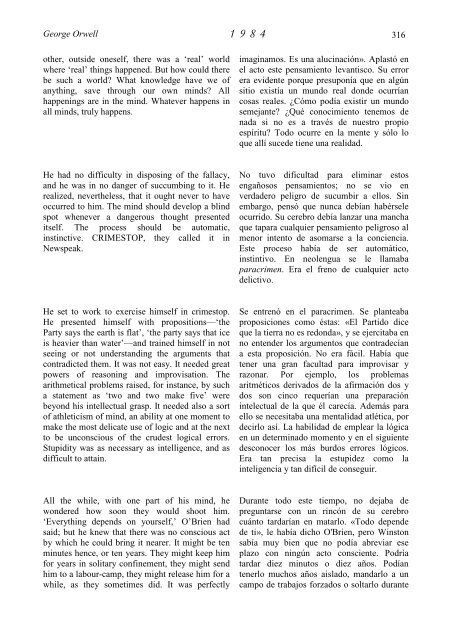You also want an ePaper? Increase the reach of your titles
YUMPU automatically turns print PDFs into web optimized ePapers that Google loves.
George Orwell 1 9 8 4<br />
other, outside oneself, there was a ‘real’ world<br />
where ‘real’ things happened. But how could there<br />
be such a world? What knowledge have we of<br />
anything, save through our own minds? All<br />
happenings are in the mind. Whatever happens in<br />
all minds, truly happens.<br />
He had no difficulty in disposing of the fallacy,<br />
and he was in no danger of succumbing to it. He<br />
realized, nevertheless, that it ought never to have<br />
occurred to him. The mind should develop a blind<br />
spot whenever a dangerous thought presented<br />
itself. The process should be automatic,<br />
instinctive. CRIMESTOP, they called it in<br />
Newspeak.<br />
He set to work to exercise himself in crimestop.<br />
He presented himself with propositions—‘the<br />
Party says the earth is flat’, ‘the party says that ice<br />
is heavier than water’—and trained himself in not<br />
seeing or not understanding the arguments that<br />
contradicted them. It was not easy. It needed great<br />
powers of reasoning and improvisation. The<br />
arithmetical problems raised, for instance, by such<br />
a statement as ‘two and two make five’ were<br />
beyond his intellectual grasp. It needed also a sort<br />
of athleticism of mind, an ability at one moment to<br />
make the most delicate use of logic and at the next<br />
to be unconscious of the crudest logical errors.<br />
Stupidity was as necessary as intelligence, and as<br />
difficult to attain.<br />
All the while, with one part of his mind, he<br />
wondered how soon they would shoot him.<br />
‘Everything depends on yourself,’ O’Brien had<br />
said; but he knew that there was no conscious act<br />
by which he could bring it nearer. It might be ten<br />
minutes hence, or ten years. They might keep him<br />
for years in solitary confinement, they might send<br />
him to a labour-camp, they might release him for a<br />
while, as they sometimes did. It was perfectly<br />
316<br />
imaginamos. Es una alucinación». Aplastó en<br />
el acto este pensamiento levantisco. Su error<br />
era evidente porque presuponía que en algún<br />
sitio existía un mundo real donde ocurrían<br />
cosas reales. ¿Cómo podía existir un mundo<br />
semejante? ¿Qué conocimiento tenemos de<br />
nada si no es a través de nuestro propio<br />
espíritu? Todo ocurre en la mente y sólo lo<br />
que allí sucede tiene una realidad.<br />
No tuvo dificultad para eliminar estos<br />
engañosos pensamientos; no se vio en<br />
verdadero peligro de sucumbir a ellos. Sin<br />
embargo, pensó que nunca debían habérsele<br />
ocurrido. Su cerebro debía lanzar una mancha<br />
que tapara cualquier pensamiento peligroso al<br />
menor intento de asomarse a la conciencia.<br />
Este proceso había de ser automático,<br />
instintivo. En neolengua se le llamaba<br />
paracrimen. Era el freno de cualquier acto<br />
delictivo.<br />
Se entrenó en el paracrimen. Se planteaba<br />
proposiciones como éstas: «El Partido dice<br />
que la tierra no es redonda», y se ejercitaba en<br />
no entender los argumentos que contradecían<br />
a esta proposición. No era fácil. Había que<br />
tener una gran facultad para improvisar y<br />
razonar. Por ejemplo, los problemas<br />
aritméticos derivados de la afirmación dos y<br />
dos son cinco requerían una preparación<br />
intelectual de la que él carecía. Además para<br />
ello se necesitaba una mentalidad atlética, por<br />
decirlo así. La habilidad de emplear la lógica<br />
en un determinado momento y en el siguiente<br />
desconocer los más burdos errores lógicos.<br />
Era tan precisa la estupidez como la<br />
inteligencia y tan difícil de conseguir.<br />
Durante todo este tiempo, no dejaba de<br />
preguntarse con un rincón de su cerebro<br />
cuánto tardarían en matarlo. «Todo depende<br />
de ti», le había dicho O'Brien, pero Winston<br />
sabía muy bien que no podía abreviar ese<br />
plazo con ningún acto consciente. Podría<br />
tardar diez minutos o diez años. Podían<br />
tenerlo muchos años aislado, mandarlo a un<br />
campo de trabajos forzados o soltarlo durante


